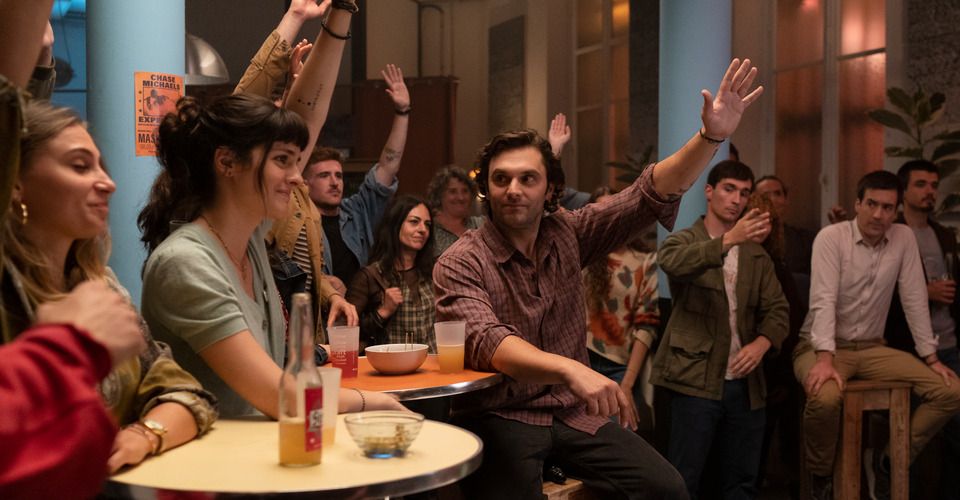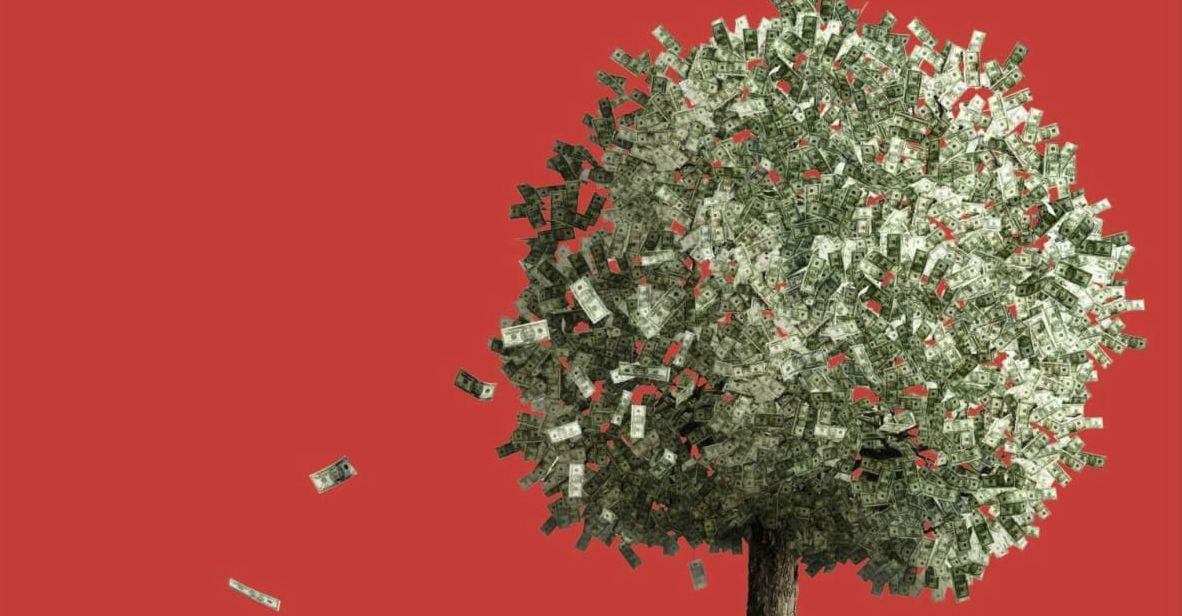Much is made of the insurmountable barrier that is meant to exist between climate activists and working people. Politicians, usually trying to justify their interference with civil liberties, frame climate protesters as a nuisance — if not a threat — to the otherwise “normal” public: environmentalists are coming for jobs, cars, and household appliances; everyone else is just trying to get by with what little they have.
This tension fuels the comedy in Olivier Nakache and Éric Toledano’s new film A Difficult Year (Une année difficile), which chronicles what happens when Albert and Bruno, two heavily indebted middle-aged men, join a climate action group in order to drink the free beers and siphon off donated goods. What follows is predictable: after spending a while taking advantage, the pair become invested. Whether they ever really believe in green politics is unclear, but they come to enjoy the community the group offers, and especially the romantic potential embodied by its leader, Valentine.
In some ways this story, told this way, has value. Combatting isolation is both a motive and a method in building political ties, and it’s moving to see the empty house in which we first find a desolate Bruno full, later, with his new friends. What the film fails to draw out is that a relationship between those experiencing financial distress and those concerned about the climate doesn’t have to be based around friendship alone. Far from being reasons for one group to grift the other, debt and climate change can be, should be, and often are fought as intertwined problems.
Take how those problems are experienced. Both Bruno and Albert are implied to be chronic over-spenders by their attendance at a budgeting class where teacher Henri tells them to repeat this mantra each time they want something: “Do I need it? Do I really need it? Do I really need it now?” The pervasiveness of this way of getting into debt is touched on in a scene towards the end of the film, in which, following one character’s injury, Albert opens the door to a hospital staff room to find Henri teaching the same class to the workers there.
At some point, debt so widespread has to come to be understood collectively, in the context of an economic system that demands increasing sums not only for necessities but for things we’re told are required to live happily — to achieve, as David Graeber writes, “a life that goes in any way beyond sheer survival.” Graeber’s argument that everyone (his italics) is in debt in part because debt, in our world, is tied to love, in that it allows us to do those things that make the world a communal experience, is made literal in Bruno’s case: we learn later that he racked up his debt trying to stop his wealthy wife noticing their class difference.
Mantras like Henri’s might help in the individual case, then, but in these circumstances, debt is personal in the same way that getting swept away by a climate change-induced flood is personal. The connection is even made explicit in the public language used to describe debt, which comes in waves, storms, and tsunamis.
Then there are the underlying reasons. A Difficult Year takes an anti-consumerist line, opening with slow-motion Black Friday scraps that demonstrate how the struggle for cheap goods dehumanises us. In doing so, it so goes some way towards acknowledging that the system forcing workers with what should be good public sector jobs into budgeting classes is the same one causing the climate disasters Valentine rallies her comrades against.
Frontlining consumerism specifically rather than capitalism more broadly, however, leaves open the prospect that debt and climate change are still the products of individual failures of self-control, rather than features of a society geared towards extracting as much as it can from both the planet and the working class. The global debt crisis is instructive here, demonstrating how that extraction continues well past the consent of the debtors and even the limits of its own viability. As the 2022 report from the Climate Action Network states:
Many global south countries are trapped repaying vast sums to their creditors every year, hampering their ability to respond to the mounting impacts and costs of the climate crisis. At the same time, extreme climate events and insufficient grant-based climate finance are forcing indebted countries deeper into debt, keeping many locked in fossil fuel production, as the main source of income to guarantee debt service payment, and creating a vicious cycle that can be impossible to escape.
The same report notes that the absence of sufficient climate finance in the global south sometimes means individuals and households are left to fund their own climate action needs — often by, yes, going into debt.
Thomas Sankara, in speaking of global south debt as a form of “skilfully managed reconquest” by colonial powers, emphasises how the logic of extraction returns again and again in different forms. That’s likely to be true in a domestic context, too, even if the consumerist model were overcome. Albert, Bruno, and Valentine’s shared struggle isn’t just against cheap TVs: it’s against the hegemony of this logic, which, followed to its conclusion, guarantees despair and disaster.
On a personal level, the shared experience of despair is important, too. In Payback: Debt and the Shadow Side of Wealth, Margaret Atwood argues that in the twenty-first century, the most important debt to worry about is the ecological debt we owe the Earth. Graeber warns against this kind of metaphor — to him, it reduces experience to the same language of cold calculation that got us here in the first place — but Valentine’s description of the sinking feeling of climate anxiety in A Difficult Year, her inability to think about anything else, the growing tension in her family relationships, appears to resonate with Albert and Bruno, and perhaps this is why: all of them are trying to get back into the black.
Since their suffering is connected, so is their anger. Albert and Bruno clearly enjoy the opportunities the climate group gives them to march into lecture halls and shout. They’re taking the piss, hamming things up for the sake of their nominal comrades, but it doesn’t seem unreasonable to imagine they also find it cathartic. The elites that the nameless suits on the panel represent have failed them as well as the planet.
Other reactions echo in more perverse ways. A link is drawn between Bruno and Valetine’s mutually empty houses — Bruno because he’s sold off all his possessions to pay his debts and Valentine because she practices a minimalistic anti-consumerism. Minimalism by choice or by compulsion are obviously different things (and a comment on the class difference of the two groups is made by the fact that Valentine’s home, however sparse, is grand), but the fact remains that both characters see getting rid of stuff as a way to further their causes — a thread that could be followed towards the principle of “from each according to their ability, to each according to their need.”
Despite all these links, Bruno and Albert never come to see themselves as having a “cause” beyond their individual relief. This is emphasised when they propose a demonstration at the Bank of France on the basis of its refusal to stop new fossil fuel contracts, an event they intend to use as cover while they dig out their own files and rule themselves eligible for debt cancellation. Doing so is a bigger act of rebellion than they recognise — Graeber writes that “for the last five thousand years, with remarkable regularity, popular insurrections have begun the same way: with the ritual destruction of the debt records” — but even with immediate access to the files of all the many, many others seeking a similar amnesty, the pair are only concerned with helping themselves, and only regret that because it gets them caught.
This is where the film’s “insurmountable barrier” premise hits a wall. Albert and Bruno can find affinity with the protesters on the basis of friendship, of romance, even (potentially) of shared concern about the planet, but because workers and climate activists are believed to be distinct groups with definitionally opposing goals, the prospect that they might realise their real struggles are the same remains impossible even when it seems, plot-wise, inevitable. Expecting otherwise might be asking too much: this is a romantic comedy, after all, and makes no claim to social realism. Albert is cartoonishly naïve about climate change, a manifestation of the quickly debunked myth that working-class people don’t care about the planet. Valentine and her comrades are caricatures, too, taking on twee aliases (Pompom, Quinoa), and incapable of imagining that to some among them, being able to own lots of things sounds like a luxury, not an outrage.
I’ll counter that it’s exactly genres like comedy that, in an absurd world, allow us to ask too much. During a recent Q&A at the Toronto International Film Festival, Nakache said he didn’t necessarily want his characters to come out of their experiences “changed”. Yet Albert, at least, is changed, to the extent that he’s afforded a “fairytale” (Nakache’s word) ending on honest terms with Valentine, whose conditions for a romantic relationship — that all planes are grounded — are miraculously fulfilled by the pandemic. So why not a miraculous discovery of solidarity, too?
A Difficult Year misses the solution evident in its own story. Were it to look more closely, the film might challenge the weak political clichés it skewers with powerful truths: that those worried about the climate and their money have more in common than what divides them; that only a movement focused on ending both environmental and economic exploitation can defeat a politics with no interest in stopping either.



